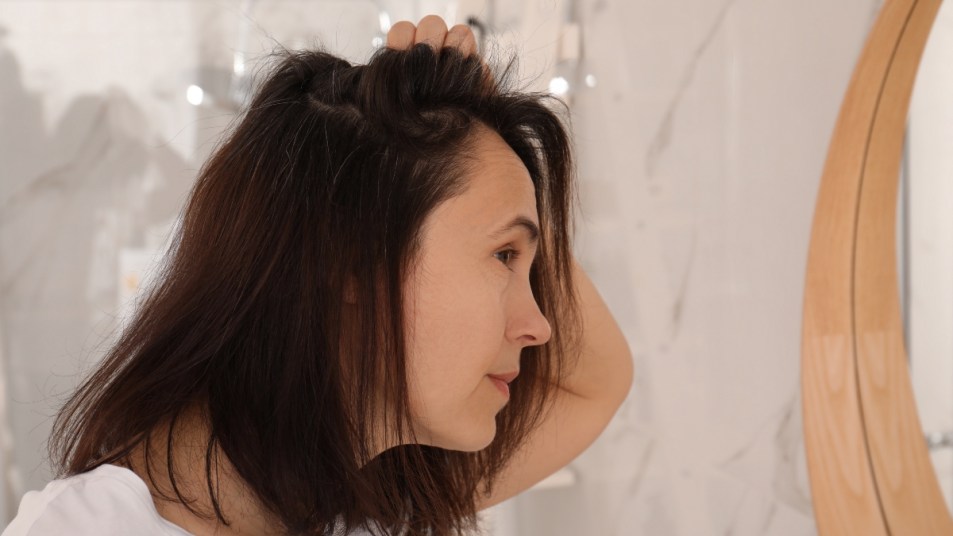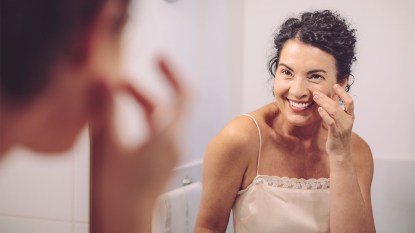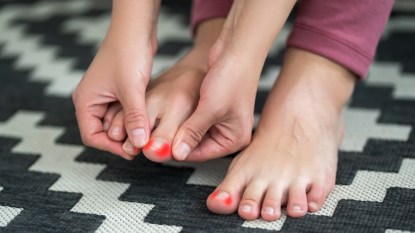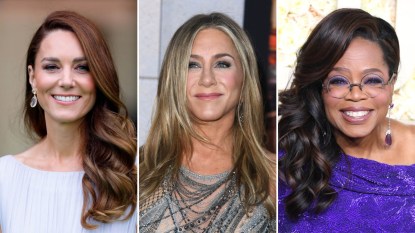How Fast Does Hair Grow — And Are There Ways To Make Thinning Hair Grow Faster (And Fuller)?
Show your locks some love.

I’ve always had naturally curly hair. In my twenties, it was thick and unruly. In an attempt to tame my curls, I applied copious amounts of leave-in conditioner and frizz spray, and I flat-ironed my hair until the ends were burnt to a crisp. Now, of course — more than 20 years later — I wish I had that volume. Alas, my hair is thinner and more prone to breakage since I entered perimenopause. I’d never before thought about hair thickness, but now I find myself Googling things like “How fast does hair grow?” and “Is it possible to make hair grow faster or thicker?”
If, like me, you’ve wondered the same, you’re in the right spot. Below is what I’ve learned from my incessant hair growth research; specifically, what you can do to make hair grow faster.
How fast does hair grow?
You’ve likely heard that hair grows six inches each year. Experts, however, say this isn’t necessarily true. Why? Because it doesn’t take every hair growth factor into account. Hair can grow faster or slower depending on ethnicity, hair type, genetics, emotional health, and more. One study from the International Journal of Dermatology found that people of Asian descent typically experience the fastest new hair growth, at an average six inches per year.
Conversely, people of African descent typically have the slowest-growing hair, at an average of around four inches per year. Other ethnicities experienced hair growth somewhere between four to six inches per year. However, hair growth can depend on a number of external and genetic factors, as well. Hair growth during pregnancy can change due to hormonal fluctuations. Hair growth can also slow as we age — thinning hair accompanying aging is a common experience in both men and women.
Can I make my hair grow faster?
I can’t count the number of times I’ve wished for faster-growing hair — which has increased since I turned 40 nearly two decades ago. Longer hairstyles are just more flattering on my round face, but with curly hair, growth can feel painfully slow. Whether it’s actually possible to speed up hair growth is a hotly debated issue.
We’re born with all of the hair follicles we’ll ever have — usually around 100,000 — and each strand of hair on our heads is connected to one of these follicles. That would seem like a fixed equation: e.g., your hair is your hair is your hair. Curly, thin, thick, dry? It is what it is. But while there is no way to increase the number of hair follicles you have, there are several things you can do to keep and maintain the ones you’ve got, and therein support thicker, healthier hair. (A disclaimer: None of these remedies will give you thicker or longer hair overnight. Most hair growth solutions take months to yield results. Patience is key.) Disclaimers aside, here’s what you can do to promote fast and healthy hair growth.
Stay on top of your vitamins and nutrients.
It takes a lot of nutrients and calories to make hair grow, so keeping a healthy diet and ensuring you’re consuming necessary vitamins and minerals is one way to promote hair growth. While many companies promote vitamins and supplements for hair growth, scientific research on supplements has produced mixed results. Generally, getting nutrients like vitamin A, vitamin C, and biotin from foods and consuming a healthy and balanced diet is preferable to and more beneficial than taking daily hair growth supplements.
Health experts define a balanced diet as one that includes plenty of fruits and vegetables; whole grains and fiber; a variety of protein sources, including nuts, beans, and fish; dairy products; and healthy fats and oils. (Protein is especially important, as protein deficiency is often a key factor in hair loss.) Additionally, drink plenty of water.
If you’re dead set on taking a hair growth supplement, look for one that contains omega-3 fatty acid fish oils. One study found that consuming fish oil helped lengthen hair fibers and promote growth in mice. That said, there aren’t yet studies that have produced the same results in humans. Much more research is needed to conclusively determine the connection between certain vitamins and hair growth.
Try hair oiling.
It might sound counterintuitive, especially if you’re prone to oily hair, but applying essential oils with carrier oil may help indirectly promote fast hair growth by improving scalp health and hydration. Specifically, tea tree oil, rosemary oil, and lime essential oil have all been found to promote a healthy scalp and help boost hair health. Undiluted essential oils are highly potent and may cause irritation on your scalp or skin, though, so be sure to dilute essential oils in a carrier oil, such as argan oil, jojoba oil, or coconut oil.
Hair oiling is a tradition in many cultures that goes back centuries, and the practice itself may help stimulate hair growth by promoting hydration and revitalizing your scalp. Plus, it can be extremely relaxing to apply aromatic oil to the scalp and hair. Think of it as killing two birds with one stone — you’re promoting your mental health and supporting hair growth at the same time.
If hair oiling doesn’t sound appealing to you, consider trying a shampoo that’s right for hair thinning.
Give topical ointments a try.
If your hair growth has ventured beyond “thin and slowing down” into active hair loss, you may want to give topical ointments, such as Rogaine, a try. The topical hair products listed below have been shown to slow hair loss under certain conditions:
- Topical melatonin
- Topical minoxidil 5%, AKA Rogaine
- Prescription finasteride topical (AKA Propecia)
Styling products that include these ingredients can be extremely effective in slowing hair loss and promoting hair regrowth, and most of them are available over the counter. The caveat, however, is that they’re designed for people actively suffering from pattern baldness and hair loss. If your hair growth cycle is slowing down but not necessarily vanishing, they aren’t going to be as helpful. I strongly suggest consulting a dermatologist before using these.
Try keratin supplements.
Evidence that definitively proves vitamin and mineral supplements promote hair growth is limited. Of the existing evidence, however, keratin supplements as a solution for thinning strands have the strongest case. A frequent cause of hair loss is protein deficiency, and keratin — which is a type of protein — could help to address that. One study conducted by dermatologists found that keratin may help to increase hair strand diameter, treat damaged hair, and decrease hair loss. Much more research is needed, of course, but what is presently known about keratin and hair growth is promising.
Give your hair a boost of … caffeine?
Odd as it may sound, preliminary studies show that caffeinating your hair is one way to promote hair growth. Like most things related to this topic, more research is needed, but the idea that caffeinated topical formulas can help decrease hair loss and promote growth at the hair follicle level has a lot of people talking. One way to incorporate caffeine into your hair care routine is by purchasing products that include caffeine as an ingredient. Basic shampoo and conditioner are a good place to start. The regular application of caffeine to the hair follicles may speed up hair growth over time, and promote regrowth if you’re experiencing hair loss and breakage.
Rate of Hair Growth: Luck of the Draw
Everything that we’ve talked about – consuming a healthy and balanced diet, taking keratin supplements, applying topical ointments, hair oiling, and caffeinating – may promote hair growth and slow hair loss. Or … it may not. The unfortunate truth is that much more research is needed to conclusively determine which products and therapies, if any, are most effective for speeding hair growth and preventing hair problems like split ends and dandruff. That said, treatments for alopecia and other hair loss conditions do exist. If, however, your issue is the mere march of time, your hair growth depends much more on genetics and luck. Thinning hair is just a part of aging: Painful as it may be, it’s part of the gift that is living a long life.













